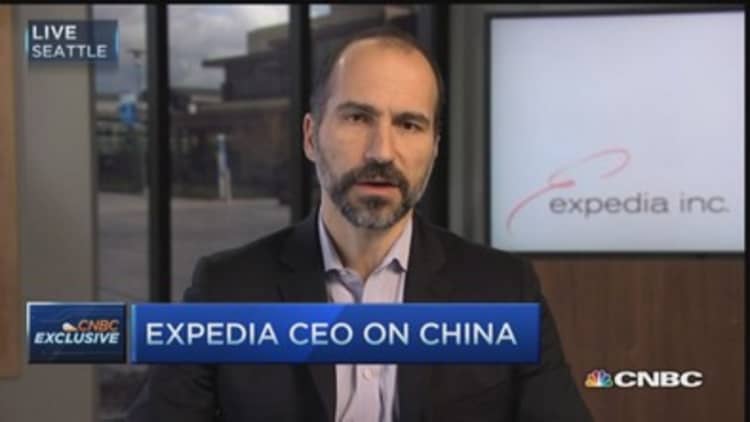You know who's not at all worried about the Expedia-Orbitz tie-up? Priceline investors.
Shares of Priceline have climbed 4.1 percent in the two trading days since Expedia's $1.6 billion acquisition of Orbitz was announced Thursday morning. Expedia shares are up even more, jumping 14 percent.
While on paper the combination of Expedia and Orbitz creates a bigger competitor for Priceline in the online travel agent (OTA) market, there's an even larger Internet company that scares all of them: Google.
Read MoreExpedia buys rival Orbitz
Priceline, Expedia and Orbitz all write huge and frequent checks to Google so when a traveler does a search for a hotel in New York or London, the OTAs get prominent placement in the paid results sections on the top and right said the page.
By having fewer rivals, the thinking goes, there's diminished competition in search and on industry-specific sites like TripAdvisor. That's all the more important, because Google is viewed as more than just a critical source of traffic. It's also seen as a challenger after acquiring airline comparison service ITA Software in 2011 and introducing an accommodation search service Hotel Finder.
"You would expect a more consolidated OTA sector to increase both Expedia and Priceline's power versus the hoteliers, and maybe over time push down the amount they have to spend to acquire customers, given fewer players competing for traffic from channels such as Google and TripAdvisor," said James Cordwell, an analyst at Atlantic Equities in London. He has a "hold" rating on Expedia and "overweight" on Priceline.
Read MorePriceline less dependent on Google
Expedia's agreement to buy Orbitz for $12 a share amounted to a 25 percent premium from the prior day's closing stock price. The deal came just weeks after Expedia, which owns brands like Hotels.com and Hotwire, acquired booking site Travelocity for $280 million.
Expedia and Orbitz recorded combined revenue in the past year of $6.7 billion, compared with $8.1 billion for Priceline in the past four recorded periods (fourth quarter results are scheduled for Thursday). But from a market capitalization perspective, Priceline, based in Norwalk, Connecticut, has a much bigger advantage with a $57.8 billion valuation versus $11.3 billion for Expedia.
Priceline's march toward dominance began in 2005, when it acquired an Amsterdam-based online hotel reservation service called Bookings. That business, now called Booking.com, became the revenue and profit driver for Priceline by building the leading global brand in hotel bookings.
Read MoreBooking.com bets on last minute travelers
In bulking up, Expedia and Priceline have been in a brutal battle for customers booking travel over the Internet.
Expedia's direct selling and marketing costs, which includes search and other web advertising, jumped 32 percent in 2014 to $2.26 billion. Priceline hasn't filed its 2014 annual report yet, but in 2013 the company spent $1.8 billion on Internet marketing, a 41 percent increase from the prior year. Mark Mahaney, an analyst at RBC Capital Markets, estimates 90 percent of that went to Google.

Then comes Google, the competitor.
Type in "San Francisco hotel" into Google search, and just under some paid ads is a box that lets users comparison shop without leaving the page. As growth slows in the search market and consumer activity moves to mobile, Google is playing a bigger role in markets where it historically just sent search traffic.
"Travel is a $1.3 trillion global market with competitors from all sides--OTAs, direct suppliers metaplayers and, increasingly, Google--clamoring for the same set of customers at the top of the funnel," said Sarah Gavin, a spokeswoman for Bellevue, Washington-based Expedia, in an e-mail. "Certainly competition is fierce."
A spokesperson for Priceline declined to comment, and Mountain View, California-based Google didn't respond to a request for comment.
Read MoreCramer eyes euro and Priceline
Henry Harteveldt, an online travel expert and founder of Atmosphere Research Group, isn't so optimistic that a bigger Expedia will help Priceline.
"Expedia is now a stronger competitor and will have more leverage to use with hotels, which is Expedia's most profitable line of business," said Harteveldt, who's based in San Francisco.
So why were investors buying up Priceline shares after the deal was announced?
"It reinforces that online travel is clearly real," Harteveldt said. "Priceline is well positioned to benefit from it."


